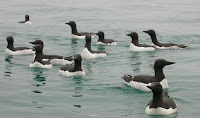 Now there's a title of a scientific paper that makes me sit up and take notice. In this era of doom and gloom, it's nice to hear some good news.
Now there's a title of a scientific paper that makes me sit up and take notice. In this era of doom and gloom, it's nice to hear some good news. What's behind the title? Let's listen to the authors:
Recent reports on the state of the global environment provide evidence that humankind is inflicting great damage to the very ecosystems that support human livelihoods. The reports further predict that ecosystems will take centuries to recover from damages if they recover at all. Accordingly, there is despair that we are passing on a legacy of irreparable damage to future generations which is entirely inconsistent with principles of sustainability.
We tested the prediction of irreparable harm using a synthesis of recovery times compiled from 240 independent studies reported in the scientific literature. We provide startling evidence that most ecosystems globally can, given human will, recover from very major perturbations on timescales of decades to half-centuries.
Accordingly, we find much hope that humankind can transition to more sustainable use of ecosystems.
Hooray, some validation that optimism is more than just wishful thinking.
hat tip: The Natural Patriot Tweet


